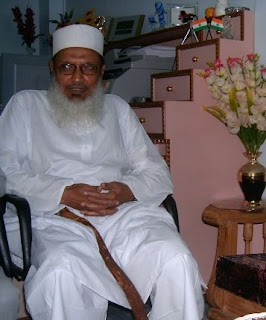By Shamshad Alam,
(Modern education institutions are gradually opening their door to madrasa graduates, and this is more important than modernization of madrasas, says renowned Islamic thinker, spiritual leader and Sajjada Nasheen of Khanqah Rahmani of Munger, Maulana Wali Rahmani)
You are the chairman of the Madrasa Modernization Committee of the Central government. What does the government mean by modernization of madrasas?

The fact is that people both in the government and outside have no practical plan or clear picture about modernization of madrasas. Neither are they aware of the system and syllabus of madrasas, nor they know the real purpose of madrasas. Only installation of computers at madrasas will not satisfy the requirements of modernization. After all, of what use will be computers in Bihar and Uttar Pradesh – two states which house most of madrasas in the country – where electricity is a rare commodity? And there is no support for purchasing generator sets and diesel. So any such programme should be chalked out keeping in view the ground realities.
How do you think madrasas can be modernized?
Madrasas are working under the Constitution’s Article 29 (1) and Article 30 (1). Any tampering with their system and syllabus is wrong. The Constitution has given the minorities the right to open and run institutions of their choice. If some people are not happy with the present system of madrasas, they should open their “model madrasa.” Those willing to go to those model madrasas, will go. The true sympathy with madrasas would be to open the doors of colleges and universities to madrasa graduates.
As chairman of the Madrasa Modernization Committee, what steps have you taken in this regard?
Our committee and the standing committee have approved a proposal that the Government of India should open model madrasas in 127 districts with considerable Muslim population. These committees have also approved a proposal that a Centre of Excellence should be opened where religious education along with other subjects is imparted. The Rahmani Foundation is ready to provide 100 acre of land for this project.
Any concrete development on opening the door of mainstream education system for madrasa graduates?
A good progress in the efforts for the last three and half years is that the National Institute of Open Schooling (NIOS) has considered madrasa students eligible for direct examination of class X and XII. They will have to appear in five papers (of which two will be language papers). For the other three papers, books in Urdu have been prepared. It has also been decided that NIOS will not charge any fee. The Union HRD ministry will bear the cost. Its centre will be opened at all prominent madrasas in the country. With this programme, madrasa students during their stay at madrasa or soon after graduating from madrasa can appear for the exam. NIOS certificates are recognized within and outside the country.
Has there been any development at university level?
Madrasa graduates can appear for BA examination from Kamraj University (Tamilnadu) in Humanities subjects (along with Arabic, Persian and Urdu). Osmania University (Hyderabad) will give admission after entrance test. Maulana Azad National Urdu University will also give direct admission. This university also runs a training programme for madrasa teachers. The last two universities in Hyderabad have been advised to design a one-year English language course for madrasa graduates. The universities have accepted the advice.
These are good steps, but not a big progress. However, it is a fact that gradually, the doors of modern education institutions are opening to madrasa graduates.
(Translated by Mumtaz Alam Falahi of TwoCircles.net, these are the abstracts from the interview by Shamshad Alam published in the Delhi-based Urdu daily Hindustan Express on August 31, 2008)
